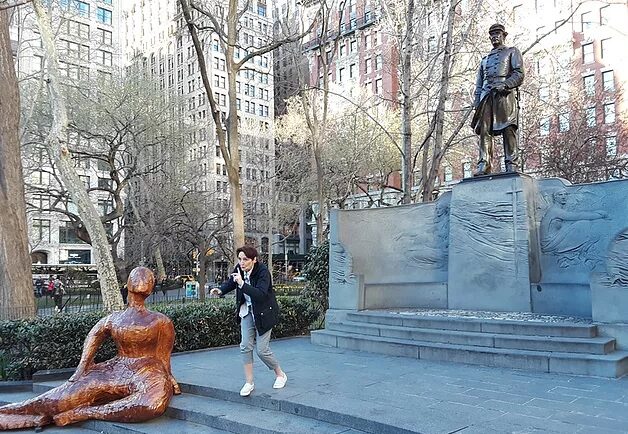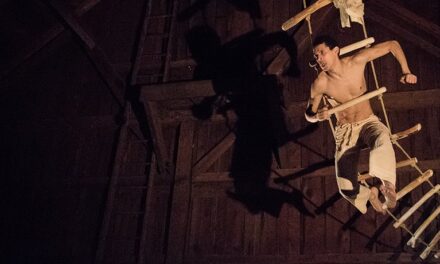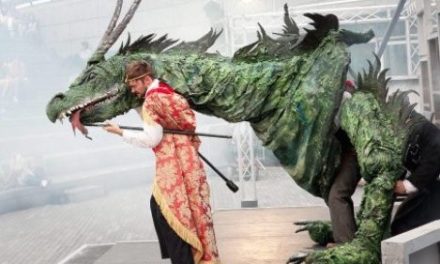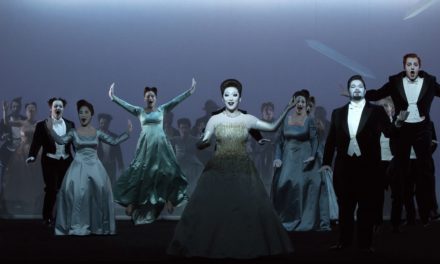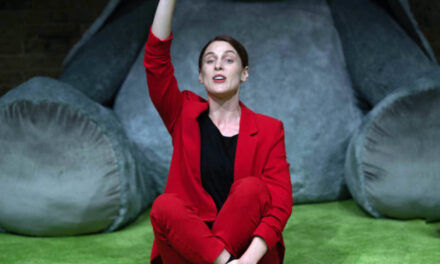At the risk of throwing a wrench in your schedule, you really do have to drop everything (for the second time in 6 months) and head over to Madison Square Park. Pick a day and do it at dusk this week. The canny visual artist Arlene Shechet has once again used her residency in this park to give lucky New Yorkers another look at a rare bygone theatrical performance, reinventing it as a wonderfully odd and reverberant environmental experience.
Shechet has some awesome friends. In October, she invited Oscar-winning Dianne Wiest to perform a half hour of excerpts from Beckett’s Happy Days (which Wiest had just done exquisitely at Theatre for a New Audience) in a dry fountain arena in the Park. It was an astonishingly rich event (see my blog on it). This time her guest is Tony- and Olivier-winning Fiona Shaw, reprising her legendary version of T.S. Eliot’s The Waste Land—again as a miraculous pop-up, with zero advance publicity. The performance is free and will be repeated three times this week, every day from 6:00 to 6:30 through Saturday. It’s not to be missed!
Shaw began performing The Waste Land in the mid 1990s at beautifully run-down theatrical spaces she scouted out with the director Deborah Warner. It played in an old rotting music hall in London, a deserted nightclub in Brussels, a former distillery in Toronto. And in NYC it ran in 1996 at the Liberty Theater in Times Square, with most of the 1000 seats of that long-derelict house draped in black, emphasizing the place’s cavernous emptiness. About 200 people a night saw Shaw move about the Liberty stage like a shape-shifting ghost, playing all the poem’s multitudinous voices with stunning specificity and clarity as her huge shadow stalked her on the crumbling walls.
The atmosphere of Madison Square Park is completely different, the polar opposite in a way, as daylight and skyscrapers steal attention, nannies scurry home with kids on scooters, guys in trim suits eyeball girls or one another and dash to happy hour somewhere. The Liberty’s controlled silence is replaced now with arbitrary street noise, absorbed fascination with the crushing indifference of the “unreal city.” This is the slick and sterile chaos that we call modern civilization, and one soon realizes, listening to Shaw, that it is precisely Eliot’s subject in his stubbornly hermetic yet strangely magisterial poem.
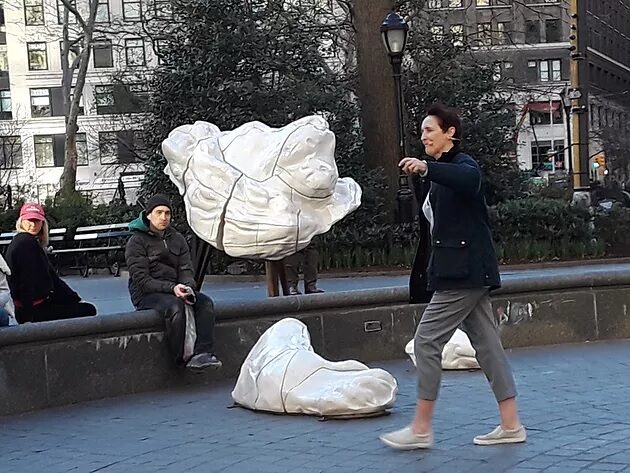
Photo Credit: Jonathan Kalb
Shaw’s performance is terrifically apt in this place in a whole new way. She walks around speaking both to us (whoever will listen, that is) and to the marvelous, purposely artificial figural and mineral-shaped sculptures by Shechet that populate the dry fountain area. In doing this, she animates the suggested life force within the sculptures while also wryly acknowledging the absurd impossibility of real communication in such a circumstance. Neither the mute porcelain, wood and iron figures nor we can wholly attend.
The power of Shaw’s Waste Land in the theater lay in making Eliot’s famously forbidding medley of disappointed, self-important and acerbic voices seem like an immediate and accessible parade of specific people we kind of felt we knew, had heard, and had probably struggled to tune out in the course of our presumably productive and cultured lives. The power of this park performance, by contrast, lies in its ready admission that the disease of modernity Eliot movingly diagnosed, indifference masquerading as industry, a sort of core desiccation within our vaunted productivity, is surely further advanced now, an even more critical condition than it was in 1996 (let alone 1922 when the poem was written). And yet we press on—there’s the tie to Beckett—assuring ourselves like mad archeologists that the cultural fragments we call precious and shore against the ravages and ruins everywhere around us will somehow amount to an ark and save us from ourselves.
And who’s to say? Maybe they will. “Here is no water but only rock,” wrote Eliot. Go watch the streams of preoccupied New Yorkers walk past the extraordinary Shaw, as a trickle of exceptions watch her rapt, to understand why it is all so heartbreaking.
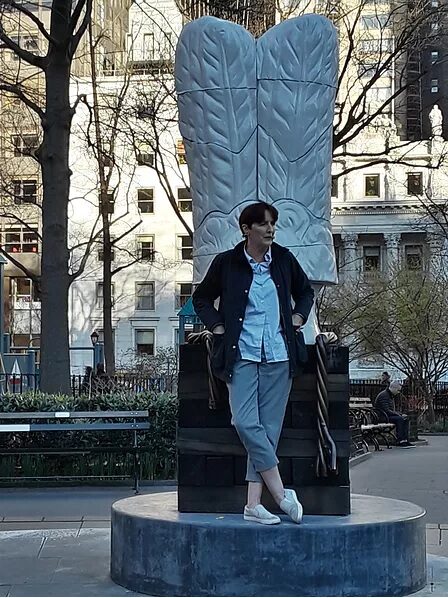
Photo Credit: Jonathan Kalb
The Waste Land
By T.S. Eliot, performed by Fiona Shaw
Madison Square Park, NYC
Apr. 10-13, 2019, 6:00-6:30
This post was written by the author in their personal capacity.The opinions expressed in this article are the author’s own and do not reflect the view of The Theatre Times, their staff or collaborators.
This post was written by Jonathan Kalb.
The views expressed here belong to the author and do not necessarily reflect our views and opinions.

